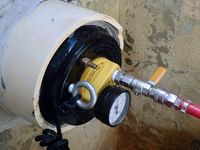Why Fix A Pool Leak?
Water loss in public pools can be an expensive problem, not just because of the high water use that can result but also because of the expensive chemicals you lose along with the water. Significant pool leaks have the potential to cause substantial damage to infrastructure by undermining pool structures and by causing areas of earth to 'swell' which can move a pool shell unevenly and cause cracks or structural failure. In the most serious of cases a long term leak can cause irreparable damage to a pool's structure. With the replacement of a pool shell potentially costing hundreds of thousands of dollars, leaking pipework is something that shouldn't be ignored.
Is Our Pool Leaking?
Water loss in public pools is perfectly normal to a point. Water is lost each time you backwash filters. Water can also be lost when patrons splash water out of a pool and even just by patrons getting out of a pool and carrying water on their body and clothing. Evaporation can cause significant water loss, particularly in outdoor pools. A 50m outdoor pool for example can easily lose 10,000 litres on a single hot summer day through a combination of evaporation, splash-out etc. Generally you'll know if you have a leaking pool. Staff will usually notice an increase in water use. A spike in your water bill or chemical usage can be another indicator. A consistently wet area near the pool or an area with particularly green grass can be a sign of a leak.
We Think We Have A Pool Leak. What Do We Do?
AC Pools offers a range of capabilities when it comes to locating leaks in pools, balance tanks and pipework. The first step is to ascertain if the pool really is leaking. Generally we'll inspect the site for anything obvious and take some measurements of water loss by measuring the change in water level over a couple of days and comparing those measurements to evaporation calculations. Once a conclusion is reached that a pool is in fact leaking there are a number of ways we can pinpoint the leak, depending on site conditions and the type of infrastructure you have. Generally a combination of testing methods are utilised starting with the most likely leak point and then methodically ruling out one part of the infrastructure at a time.
Hydrostatic Testing
Hydrostatic testing of pipework involves isolating the section of pipework to be tested, capping all openings in  the pipework, pressurising it to a test pressure (usually with compressed air) and assessing the capabilities of the pipes to hold pressure. This is the most common method used on underground pipes and will generally narrow the leak down to a single length of pipework. Often this process involves capping numerous openings into the pipe, for example a filtered water return line under the floor of a 50m pool may have 50 or more inlets that each need to be capped and sealed for the test to take place. Generally these tests can be carried out with the pool full of water and will cause no significant disruption to pool operations.
the pipework, pressurising it to a test pressure (usually with compressed air) and assessing the capabilities of the pipes to hold pressure. This is the most common method used on underground pipes and will generally narrow the leak down to a single length of pipework. Often this process involves capping numerous openings into the pipe, for example a filtered water return line under the floor of a 50m pool may have 50 or more inlets that each need to be capped and sealed for the test to take place. Generally these tests can be carried out with the pool full of water and will cause no significant disruption to pool operations.
Acoustic Leak Detection
Water escaping from a pipe underground will generally create a sound. Using specialised acoustic sensors and equipment AC Pools can follow the sounds emanating from leaks in underground pipes which will grow stronger as the sensors move closer to the leak. Utilising this method a leak can generally be pinpointed not only to the particular pipe responsible but also to the particular point along that pipe where the leak is located. Once pinpointed an excavation can be carried out at the precise position of the leak and the leak can be repaired.
Pool Shell and Balance Tank Leaks
Pool shells and balance tanks also have the potential to leak. Testing of these items is generally carried out using a variety of methods including visual inspections, inspections of expansion joints, testing of hydrostatic valves, dye-testing of possible leak points and also by isolating the structure to be tested and measuring water loss. Acoustic leak detection techniques can also be employed of these structures.